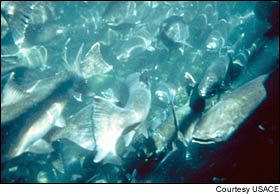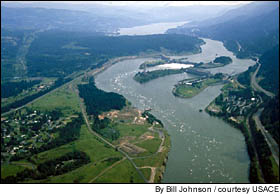forum
library
tutorial
contact

River Watch: Is Columbia Tapped Out?
by Mike StarkEnvironmental News Network, November 16, 2000
|
the film forum library tutorial contact |

|
River Watch: Is Columbia Tapped Out?by Mike StarkEnvironmental News Network, November 16, 2000 |
 In a move to help imperiled salmon
runs, a Seattle-based environmental
group says Washington state should
stop allowing water to be diverted from
the Columbia River.
In a move to help imperiled salmon
runs, a Seattle-based environmental
group says Washington state should
stop allowing water to be diverted from
the Columbia River.
The Center for Environmental Law and Policy and other conservation groups on Wednesday petitioned the state's Department of Ecology, asking the agency to put a moratorium on new water withdrawals from the river.
If the state denies the request, a lawsuit is a possibility, according to Kristie Carevich, an attorney with the group.
The issue of flow and water rights continues to be a contentious one in the Pacific Northwest. For the past four years, flow rates have dipped below federal targets in the Columbia and Snake rivers, where more than a dozen salmon and steelhead species are listed on the federal Endangered Species Act.
Those targets are meant to estimate how much water is needed to push salmon toward the ocean. Slower water means temperatures in the river can rise, water quality suffers and young salmon have a tougher time migrating, Carevich said.
Meanwhile, Washington is under increasing pressure to allow more water to be diverted from the Columbia. There are about 400 applications pending for water appropriations, including many for eastern Washington farmers looking to irrigate their crops, according to the department.
Adding to the mix are lawsuits filed in late October by cities and irrigators in eastern Washington to speed up the processing of water rights applications.
The Department of Ecology closed the Columbia and the Snake to new water withdrawals in 1992 to study whether the river could support new water uses. The department hasnít completed its studies, but the state legislature in 1997 told state officials to start processing water requests again.
Carevich said itís a mistake to allow more water to be taken from the Columbia, especially at a time when British Columbia, Idaho and the federal Bureau of Reclamation are making efforts to return water to give endangered salmon a boost.
 "It just doesnít make any sense," she
said, adding that Washington is also
funding measures to improve stream
flows. "Yet itís about to go against
that."
"It just doesnít make any sense," she
said, adding that Washington is also
funding measures to improve stream
flows. "Yet itís about to go against
that."
In a letter to Tom Fitzsimmons, the ecology departmentís director, the group said that further water appropriations would have the state "pushing these species closer to extinction and ignoring its responsibilities as a steward of Washingtonís water resources."
They say that the federal Fish Passage Center, created by the Northwest Power Planning Council to monitor fish counts and water flows on the Columbia and Snake, has documented a direct correlation between higher flows and salmon survival.
But Mary Getchell, a spokeswoman for the ecology department, said there are uncertainties in linking salmon survival with river flows.
"We absolutely believe that water thatís cool and clean is necessary for the survival of salmon," she said. "But as far as in-stream flow, the science is unsettled on the Columbia River ... Those are very scientific policy issues that the Department of Ecology is wrestling with."
Carevich countered that the claim of uncertainty a delay tactic. "That dispute was created by a lot of people that want to hold off a decision." Getchell said the department will review the petition and then decide, with consultation from the legislature, whether to start a rule-making process to implement a moratorium. If so, it could take one or two years to come up with a final decision, she said.
The conservation groups, though, are calling for an immediate halt to water appropriations on the Columbia. A new report from the Center for Environmental Law and Policy, entitled "Columbia River Vision," says there simply isnít enough water in the Columbia and its tributaries to meet "fish-critical needs."
"This petition should be a wake-up call to those claiming that the Columbia Basin salmon can be recovered without significant change," said Rob Masonis of American Rivers, one of the groups that filed Wednesdayís petition. "We should focus on identifying solutions to the challenges we face, such as improving water use efficiency and finding alternative means of providing the economic benefits of the lower Snake River dams."
Other groups filing the petition were Friends of the Earth and WaterWatch of Oregon.
learn more on topics covered in the film
see the video
read the script
learn the songs
discussion forum
